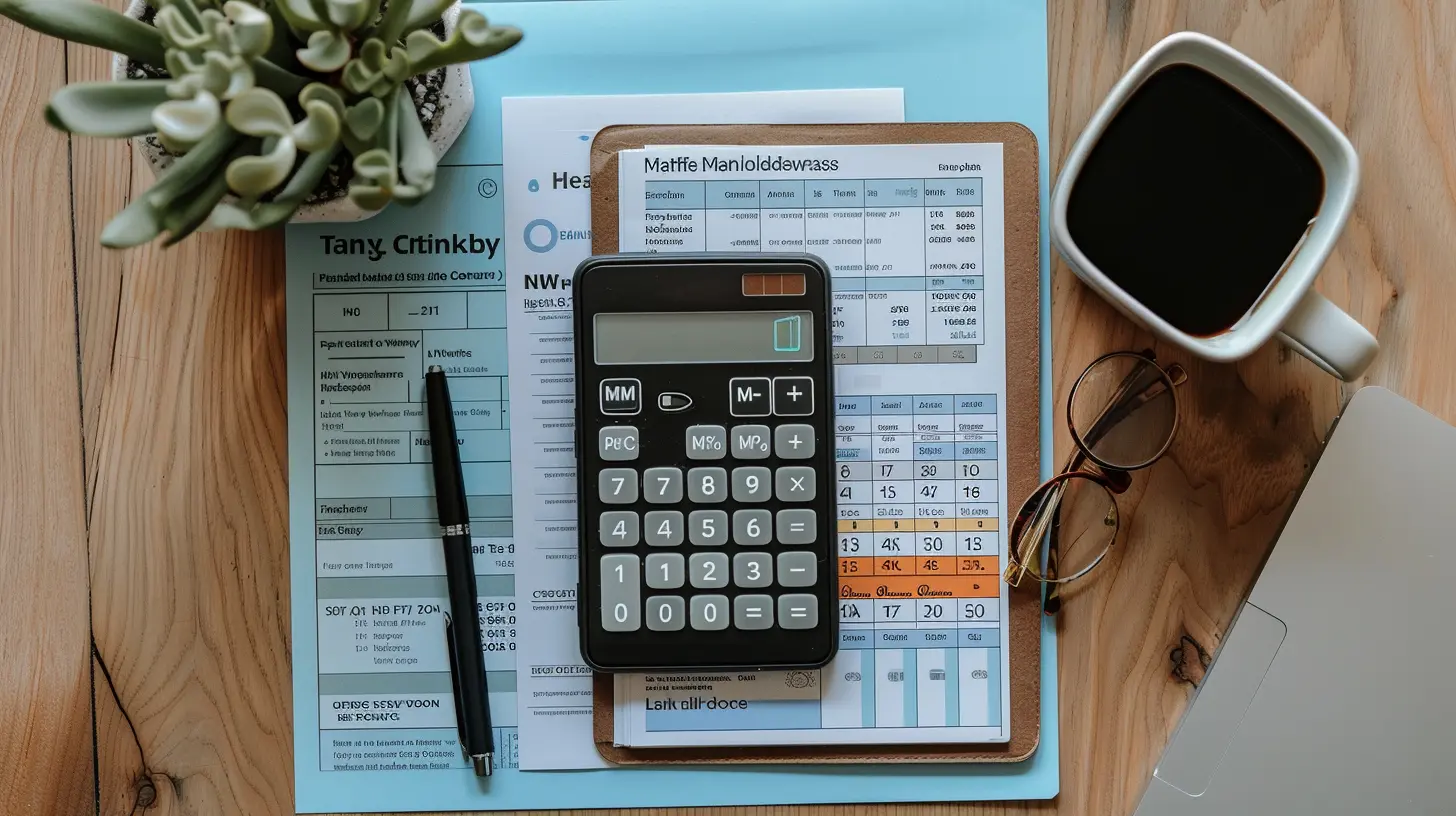The Ultimate Guide to Medical Expense Tax Deductions
1 July 2025
Let’s face it—nobody likes tax season. It’s the time of year when we all scramble to gather receipts, documents, and more coffee than we probably should drink. But here’s a silver lining you might not know about: medical expense tax deductions. That’s right—you might be able to turn those dreaded medical bills into potential savings on your tax return. Sounds too good to be true? Stick with me, and I’ll walk you through everything in simple, human speak.

What Are Medical Expense Tax Deductions?
Let’s start with the basics. A medical expense tax deduction allows you to deduct certain out-of-pocket healthcare costs from your taxable income. Translation? If you’ve spent a chunk of change visiting the doctor, dentist, or even buying hearing aids, Uncle Sam might cut you some slack.But (and there’s always a “but,” right?) not every medical bill qualifies, and there are a few hoops to jump through. Don’t worry—I'll break it all down.

Who Can Claim This Deduction?
Great question. Just because you have medical expenses doesn't automatically mean you can write them off. To be eligible, you generally need to itemize your deductions using IRS Form 1040 Schedule A.So if you normally take the standard deduction—especially since it got a hefty boost in recent years—you'll need to do some math to see if itemizing makes more sense.
Here’s a quick checklist to know if you qualify:
- You itemize your deductions.
- Your medical expenses exceed 7.5% of your adjusted gross income (AGI).
- The expenses were not reimbursed by insurance or any other source.
Sounds a bit technical? Think of it like this: if your AGI is $50,000, only the portion of your qualified medical expenses over $3,750 (which is 7.5%) is deductible.

What Medical Expenses Are Actually Deductible?
This is where things get juicy. Let’s break it down—because not everything your wallet suffered through counts, unfortunately.✅ Qualified Medical Expenses
- Doctor and hospital visits- Surgeries (as long as they aren’t cosmetic)
- Prescription medications
- Dental and vision care
- Health insurance premiums (but only in specific cases!)
- Mental health therapy
- Medical equipment and supplies (wheelchairs, hearing aids, etc.)
- Travel costs for medical reasons (bus fare, mileage, even lodging under certain limits)
Yep, even the gas you used to drive to your doctor’s appointment can count!
❌ Non-Deductible Medical Expenses
- Cosmetic surgery (unless it’s medically necessary)- Over-the-counter medications (unless prescribed)
- Gym memberships or health clubs (doesn’t matter how much you're sweating!)
- Vitamins and supplements (unless prescribed)
- Medical expenses paid by insurance
So if your dentist tried to sell you on gold fillings, sorry—that’s not going to help your tax bill.

How to Calculate Your Deduction
Let’s break this down with a simple example.Suppose your adjusted gross income is $60,000. You spent $7,200 on qualified medical expenses last year.
Here’s how you’d calculate your deduction:
1. Multiply $60,000 by 7.5% = $4,500
2. Subtract that from your total medical expenses: $7,200 - $4,500 = $2,700
3. That $2,700 is the amount you can deduct (if you itemize)
Still with me? Easy math, and possibly big savings!
Can You Deduct Medical Expenses for Others?
Absolutely. You can deduct the medical expenses you paid for the following people:- Yourself
- Your spouse
- Your dependents
- Someone who’d qualify as a dependent except for income limitations
So if you’re helping an aging parent or covering your child’s braces, you might get a tax break. Just make sure you actually paid the bills out-of-pocket.
Special Considerations for Health Insurance Premiums
This part gets tricky, but it’s worth understanding because premiums can be a major expense.Self-Employed? You’re in Luck.
If you’re self-employed and not eligible for an employer-subsidized plan (like through a spouse), you might be able to deduct 100% of your health insurance premiums. And guess what? You can do this without itemizing.Everyone Else
If you’re not self-employed, premiums can still be deductible, but they have to be part of the 7.5% threshold we discussed earlier.And remember: only the amount you paid, not what your employer covered.
What About Reimbursements?
Reimbursements can get in the way of your shiny new deduction. If you were reimbursed for a medical expense—whether by insurance, a flexible spending account (FSA), or a health savings account (HSA)—you can’t deduct that amount.It’s like trying to get two scoops of tax savings with just one cone… doesn’t work that way.
Timing Matters: When Were the Expenses Paid?
This might seem like splitting hairs, but timing can be everything. You can only deduct medical expenses in the year they were actually paid—not when the service occurred. So if you had surgery in December but paid the bill in January, it counts for next year’s taxes.Keep that in mind when tallying up your expenses.
Keep Those Receipts!
It might sound obvious, but you wouldn’t believe how many people try to claim deductions without any documentation. The IRS won’t just take your word for it.Hold on to:
- Receipts
- Billing statements
- Canceled checks or credit card statements
- Explanation of benefits (EOBs) from your insurer
And digital copies are totally fine if paper’s not your thing.
Using a Health Savings Account (HSA) or Flexible Spending Account (FSA)
If you contribute to an HSA or FSA, good news—you’re already getting tax benefits! These accounts let you pay for medical expenses with pre-tax dollars. But here’s the catch: you can’t deduct expenses you paid for using those funds.Think of it like choosing your tax break upfront or at the end—HSA/FSA is the front-loaded option.
Still, they’re hugely beneficial and worth considering if your job offers them. Free tax savings? Yes, please.
Tax Software and Professional Help
Feeling a little overwhelmed? You’re not alone. Tax software like TurboTax or H&R Block can help walk you through the process with step-by-step instructions. And if your financial situation is complex or your medical expenses hit the roof, don’t hesitate to chat with a tax pro.Sometimes peace of mind is worth more than squeezing out every last deduction.
Common Mistakes to Avoid
Okay, let’s quickly run through a few screw-ups you’ll want to sidestep:- ❌ Not itemizing deductions when your medical expenses are high enough to qualify.
- ❌ Forgetting to subtract reimbursements.
- ❌ Misunderstanding the 7.5% AGI threshold.
- ❌ Trying to deduct non-qualified stuff like cosmetic surgery or OTC meds.
- ❌ Lacking proper documentation.
Avoid those, and you’re well on your way to maximizing your tax benefit.
Don’t Forget State Deductions
Heads up: some states have their own rules for medical expense deductions, and they might be more generous than the IRS. Check your state’s tax website or consult with a local tax preparer to see if you’re missing out on extra savings.
Final Thoughts: It Can Be Worth the Effort
Medical expenses can take a serious toll on your bank account (and your sanity). While no financial band-aid can make it all go away, medical expense tax deductions can offer a bit of relief when you need it most.Itemizing might sound like a pain, but it could be the difference between a so-so refund and a much-needed cash boost.
So dust off those receipts, fire up the calculator, and take full advantage of the tax breaks you rightfully deserve. You earned it—one doctor’s bill at a time.
all images in this post were generated using AI tools
Category:
Tax DeductionsAuthor:

Julia Phillips
Discussion
rate this article
1 comments
Enid McLaurin
Unlock the power of your finances! Understanding medical expense tax deductions can lead to significant savings. Embrace this knowledge, maximize your benefits, and take control of your financial health. You’ve got this—let’s make those deductions work for you!
July 12, 2025 at 2:39 AM

Julia Phillips
Thank you! Understanding these deductions can truly empower our financial health. Let’s maximize those savings together!


